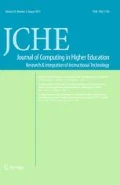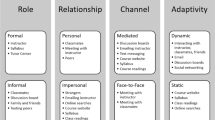Abstract
This study identifies factors that influence undergraduate students’ selection of a source of help. Learners engage in intentional decisions to seek help from human and non-human sources to resolve gaps in knowledge. Previous research in academic help-seeking assumed learners sought only human sources of assistance, resulting in a narrow understanding of how learners resolve knowledge gaps. Methodological trends in help-seeking research consistently favor quantitative, survey-based tools with pre-defined options. As a result, the factors that influence the selection of a source in a real-world setting with both human and online sources remain unexplored. The findings support including online sources in help-seeking models. Furthermore, the findings demonstrate the importance of relationships and underscore the need for an integrated framework of help-seeking. A new theory of source selection emerged which integrates academic help-seeking and information-searching behavior.


Similar content being viewed by others
References
Agosto, D. E. (2002). Bounded rationality and satisficing in young people’s Web-based decision making. Journal of the American Society for Information Science and Technology, 53(1), 16–27.
Ames, R., & Lau, S. (1982). An attributional analysis of student help-seeking in academic settings. Journal of Educational Psychology, 74(3), 414–423.
Barron, B. (2006). Interest and self-sustained learning as catalysts of development: A learning ecology perspective. Human Development, 49(4), 193–224.
Birks, M., & Mills, J. (2015). Grounded theory: A practical guide (2nd ed.). Los Angeles: Sage publications.
Brand-Gruwel, S., Wopereis, I., & Walraven, A. (2009). A descriptive model of information problem solving while using the internet. Computers & Education, 53(4), 1207–1217.
Charmaz, K. (2008). Grounded theory as an emergent method. In S. N. Hesse-Biber & P. Leavy (Eds.), Handbook of emergent methods (pp. 155–172). New York: The Guilford Press.
Charmaz, K. (2012). The power and potential of grounded theory. Medical Sociology Online, 6(3), 2–15.
Charmaz, K. (2014). Constructing grounded theory (2nd ed.). Los Angeles: Sage.
Clarebout, G., & Elen, J. (2006). Tool use in computer-based learning environments: Towards a research framework. Computers in Human Behavior, 22(3), 389–411.
Clarebout, G., & Elen, J. (2009). The complexity of tool use in computer-based learning environments. Instructional Science: An International Journal of the Learning Sciences, 37(5), 475–486.
Creswell, J. W. (2013). Research design: Qualitative, quantitative, and mixed methods approaches. Newbury Park: Sage publications.
Duffy, P. (2008). Engaging the YouTube Google-eyed generation: Strategies for using web 2.0 in teaching and learning. Electronic Journal of E-Learning, 6(2), 119–130.
Elen, J., & Lowyck, J. (1998). Students’ views on the efficiency of instruction: An exploratory survey of the instructional metacognitive knowledge of university freshmen. Higher Education, 36(2), 231–252.
Hallberg, L. R. (2006). The “core category” of grounded theory: Making constant comparisons. International Journal of Qualitative Studies on Health and Well-being, 1(3), 141–148.
Hays, D., & Singh, A. (2012). Qualitative inquiry in clinical and educational settings. New York, NY: The Guildford Press.
Järvelä, S. (2011). How does help seeking help? New prospects in a variety of contexts. Learning and Instruction, 21(2), 297–299.
Karabenick, S. A. (2003). Seeking help in large college classes: A person-centered approach. Contemporary Educational Psychology, 28(1), 37–58. https://doi.org/10.1016/S0361-476X(02)00012-7.
Karabenick, S. A. (2004). Perceived achievement goal structure and college student help seeking. Journal of Educational Psychology, 96(3), 569.
Karabenick, S. A. (2011). Classroom and technology-supported help seeking: The need for converging research paradigms. Learning and Instruction, 21(2), 290–296.
Karabenick, S. A., & Dembo, M. H. (2011). Understanding and facilitating self-regulated help seeking. New Directions for Teaching and Learning, 2011(126), 33–43. https://doi.org/10.1002/tl.442.
Karabenick, S., & Newman, R. (2009). Seeking help: Generalizable self-regulatory process and social-cultural barometer. In Contemporary motivation research: from global to local perspectives (pp. 25–48).
Karabenick, S., & Puustinen, M. (2013). Introduction. In S. Karabenick & M. Puustinen (Eds.), Advances in help-seeking research and applications: The role of emerging technologies (p. 1). Charlotte: Information Age Publishing.
Keefer, J. A., & Karabenick, S. A. (1998). Help seeking in the information age (pp. 219–250). Strategic Help Seeking: Implications for Learning and Teaching.
Kirschner, P., Strijbos, J. W., Kreijns, K., & Beers, P. J. (2004). Designing electronic collaborative learning environments. Educational Technology Research and Development, 52(3), 47.
Kitsantas, A., & Chow, A. (2007). College students’ perceived threat and preference for seeking help in traditional, distributed, and distance learning environments. Computers & Education, 48(3), 383–395.
Kitsantas, A., Dabbagh, N., & Dass, S. (2013). Using learning technologies to support help-seeking in higher education contexts. In S. Karabenick & M. Puustinen (Eds.), Advances in help-seeking research and applications: The role of emerging technologies (p. 73). Charlotte, NC: Information Age Publishing.
Kozanitis, A., Desbiens, J., & Chouinard, R. (2007). Perception of teacher support and reaction towards questioning: Its relation to instrumental help-seeking and motivation to learn. International Journal of Teaching and Learning in Higher Education, 19(3), 238–250.
Kuhlthau, C. C. (1991). Inside the search process: Information seeking from the user’s perspective. Journal of the American Society for Information Science, 42(5), 361–371.
Kuhlthau, C. C. (2004). Seeking meaning: A process approach to library and information services. Westport: Libraries Unltd Incorporated.
Makara, K., & Karabenick, S. (2013). Characterizing sources of academic help in the age of expanding educational technology: A new conceptual framework. In S. Karabenick & M. Puustinen (Eds.), Advances in help-seeking research and applications: the role of emerging technologies (pp. 37–72). Charlotte: Information Age Publishing.
Mäkitalo-Siegl, K., Kohnle, C., & Fischer, F. (2011). Computer-supported collaborative inquiry learning and classroom scripts: Effects on help-seeking processes and learning outcomes. Learning and Instruction, 21(2), 257–266.
Nelson-Le Gall, S. (1985). Help-seeking behavior in learning. Review of Research in Education, 12, 55–90.
Nelson-Le Gall, S. A., & Gumerman, R. A. (1984). Children’s perceptions of helpers and helper motivation. Journal of Applied Developmental Psychology, 5, 1–12. https://doi.org/10.1016/0193-3973(84)90023-6.
Newman, R. S. (1994). Academic help-seeking: A strategy of self-regulated learning. In D. H. Schunk & B. J Zimmerman (Eds.), Self-regulation of learning and performance: Issues and educational applications (pp. 283–301). Hillsdale, NJ: Lawrenlce Erlbaum Associates, Inc.
Newman, R. S. (2002). How self-regulated learners cope with academic difficulty: The role of adaptive help seeking. Theory Into Practice, 41(2), 132–138.
Newman, R. S., & Goldin, L. (1990). Children’s reluctance to seek help with schoolwork. Journal of Educational Psychology, 82(1), 92.
Puustinen, M., & Karabenick, S. (2013). Conclusions and future directions. In S. Karabenick & M. Puustinen (Eds.), Advances in help-seeking research and applications: the role of emerging technologies (p. 265). Charlotte: Information Age Publishing.
Puustinen, M., & Rouet, J. (2009). Learning with new technologies: Help seeking and information searching revisited. Computers & Education, 53(4), 1014–1019. https://doi.org/10.1016/j.compedu.2008.07.002.
Puustinen, M., Volckaert-Legrier, O., Coquin, D., & Bernicot, J. (2009). An analysis of students’ spontaneous computer-mediated help seeking: A step toward the design of ecologically valid supporting tools. Computers & Education, 53(4), 1040–1047. https://doi.org/10.1016/j.compedu.2008.10.003.
Schworm, S., & Gruber, H. (2012). E-learning in universities: Supporting help-seeking processes by instructional prompts. British Journal of Educational Technology, 43(2), 272–281.
Strauss, A., & Corbin, J. (1998). Basics of qualitative research: Procedures and techniques for developing grounded theory. Thousand Oaks: Sage Publications.
Tricot, A., & Boubee, N. (2013). Is it so hard to seek help and so easy to use google? In S. Karabenick & M. Puustinen (Eds.), Advances in help-seeking research and applications: the role of emerging technologies. Charlotte: Information Age Publishing.
Van den Beemt, A., & Diepstraten, I. (2016). Teacher perspectives on ICT: A learning ecology approach. Computers & Education, 92, 161–170.
Vermetten, Y. J., Vermunt, J. D., & Lodewijks, H. G. (2002). Powerful learning environments? How university students differ in their response to instructional measures. Learning and Instruction, 12(3), 263–284.
Wilson, D., & Sperber, D. (2002). Relevance theory. In G. Ward & L. Horn (Eds.), Handbook of Pragmatics. Oxford: Blackwell.
Zimmerman, B. J. (2008). Investigating self-regulation and motivation: Historical background, methodological developments, and future prospects. American Educational Research Journal, 45(1), 166–183. https://doi.org/10.3102/0002831207312909.
Zimmerman, B. J., & Pons, M. M. (1986). Development of a structured interview for assessing student use of self-regulated learning strategies. American Educational Research Journal, 23(4), 614–628.
Author information
Authors and Affiliations
Corresponding author
Ethics declarations
Conflict of interest
The authors declare that they have no conflict of interest.
Additional information
Publisher's Note
Springer Nature remains neutral with regard to jurisdictional claims in published maps and institutional affiliations.
Rights and permissions
About this article
Cite this article
Giblin, J., Stefaniak, J., Eckhoff, A. et al. An exploration of factors influencing the decision-making process and selection of academic help sources. J Comput High Educ 33, 1–18 (2021). https://doi.org/10.1007/s12528-020-09252-0
Published:
Issue Date:
DOI: https://doi.org/10.1007/s12528-020-09252-0




